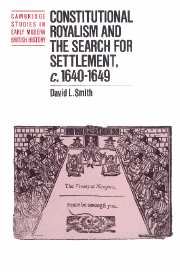Book contents
- Frontmatter
- Contents
- Acknowledgements
- List of abbreviations
- A note on quotations, sources, dates and terminology
- PART I THE ORIGINS OF CONSTITUTIONAL ROYALISM
- PART II CONSTITUTIONAL ROYALISM IN THEORY AND PRACTICE, 1642–1649
- PART III CONSTITUTIONAL ROYALISM IN PERSPECTIVE
- 8 Epilogue: Constitutional Royalism from Regicide to Restoration
- 9 Legacy: an ideology vindicated?
- 10 Conclusion: assessment and evaluation
- Bibliography
- Index
- Cambridge Studies in Early Modern British History
8 - Epilogue: Constitutional Royalism from Regicide to Restoration
from PART III - CONSTITUTIONAL ROYALISM IN PERSPECTIVE
Published online by Cambridge University Press: 01 October 2009
- Frontmatter
- Contents
- Acknowledgements
- List of abbreviations
- A note on quotations, sources, dates and terminology
- PART I THE ORIGINS OF CONSTITUTIONAL ROYALISM
- PART II CONSTITUTIONAL ROYALISM IN THEORY AND PRACTICE, 1642–1649
- PART III CONSTITUTIONAL ROYALISM IN PERSPECTIVE
- 8 Epilogue: Constitutional Royalism from Regicide to Restoration
- 9 Legacy: an ideology vindicated?
- 10 Conclusion: assessment and evaluation
- Bibliography
- Index
- Cambridge Studies in Early Modern British History
Summary
This chapter extends the biographical sketches presented in chapter 3 down to the Restoration of Charles II. It will look in turn at the experiences of those Constitutional Royalists who lived through the 1650s, and analyse how they came to terms with the Commonwealth and Protectorate. My argument will be that the Constitutional Royalists typically survived these years by retreating into seclusion, by withdrawing into a private world of friendships and political quiescence. Many of them were utterly convinced that times would change and the monarchy would ultimately be restored. But in the meantime they preferred to live quietly and have as little as possible to do with the Interregnum regimes, in the belief that co-operation would compromise their principles while an insurrection could only jeopardise Charles II's eventual return. This characteristic response was celebrated in Royalist poetry of the period; and it is remarkable how infrequently it was punctuated by attempts to foment disorder and to subvert the republic.
This retirement from public life forms a leitmotiv in Sir Edward Walker's account of the Knights of the Garter in these years. It is described particularly vividly in the cases of two peers who died during the Interregnum, Dorset and Richmond. According to Walker, 'after the barbarous murder of the King his master' Dorset 'never stirred out of his house' in London. There is plentiful evidence in the records of Chancery to support this statement.
Dorset's withdrawal from litigation continued thereafter. Between February 1651 and his death in July 1652, Chancery dismissed no fewer than three suits begun by Dorset 'for want of further prosecution'.
- Type
- Chapter
- Information
- Publisher: Cambridge University PressPrint publication year: 1994



